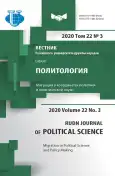World Geopolitical Competition in the Context of the Fourth Industrial Revolution
- Authors: Blokhin K.V.1
-
Affiliations:
- Center of Security Problems of Russian Academy of Science
- Issue: Vol 22, No 3 (2020)
- Pages: 339-351
- Section: MIGRATION: GLOBAL CONTEXT
- URL: https://journal-vniispk.ru/2313-1438/article/view/322167
- DOI: https://doi.org/10.22363/2313-1438-2020-22-3-339-351
- ID: 322167
Cite item
Full Text
Abstract
Article analyzes predictive estimates and concepts presented by the Western intellectual community, regarding prospects for development of new trends in the global economy, caused by the fourth industrial revolution. Author draws on a variety of sources, including reports from US think tanks, works by representatives of global financial and technocratic elite, and works by American intellectuals. Methodological basis of the study is a theory of the world system of I. Wallerstein, which allows to identify dynamic and conflicting lines of interaction between two geopolitical centers of the world - the United States and China. Based on an analysis of current trends, modern experts predict revolutionary changes in modern technologies that can decisively affect socio-political stability, not only in Western countries, but in developing countries as well. Author shows that the new technological structure is changing not only sector structure of the economy, but also has a strong impact on employment. According to American analysts, new technologies can destabilize socio-political stability in any country, especially in countries where cheap labor is a traditional tool. Robotization and automation of production can become a competitive advantage of the United States and Western countries in competition with China. Article notes that Russia is only at the very beginning of technological revolution, behind “big five” leading countries. Overcoming its lag in the field of AI and robotics requires adoption of comprehensive measures of economic, scientific and political nature. Ignoring realities of technological progress is fraught with increase in threats to national security.
About the authors
Konstantin V. Blokhin
Center of Security Problems of Russian Academy of Science
Author for correspondence.
Email: constantinos1@rambler.ru
PhD in History, Leading Research Fellow
21 B Garibaldi St, Moscow, 117335, Russian FederationReferences
- Mann M. The End may be nigh, but for whom? Does Capitalism Have a Future? I. Wallerstein, R. Collins, M. Mann, G. Derluguian, C. Calhoun. M.: Gaidar Institute Publishing House, 2017: 113–156. (In Russ.).
- Wallerstein I. Structural crisis, or why capitalists may no longer find capitalism rewarding. Does Capitalism Have a Future? I. Wallerstein, R. Collins, M. Mann, G. Derluguian, C. Calhoun. M.: Gaidar Institute Publishing House; 2017: 23–40 (In Russ.).
- Wallerstein I. World-Systems Analysis: An Introduction. M.: URSS: Lenand, 2018: 298 (In Russ.).
- Herman A. America Needs an Industrial Policy. Hudson Institute. American Affairs. December 2019. URL: https://www.hudson.org/research/15493-america-needs-an-industrial-policy. Accessed: 20.04.2020.
- Ross A. The Industries of the Future. M.: AST Publishing House; 2017. (In Russ.).
- Varnavskiy V.G. The US Role in the World Manufacturing and Trade as a Global Issue. Outlines of Global Transformations: Politics, Economics, Law. 2018. Vol. 11 (2): 100–112 (In Russ.). URL: https://cyberleninka.ru/article/n/rol-ssha-v-mirovoy-promyshlennosti-i-torgovle-kak-globalnaya-problema/viewer. Accessed: 20.04.2020.
- Ford M. Rise of the Robots: Technology and the Threat of a Jobless Future. M.: Alpina non-fiction; 2016. (In Russ.).
- Trump. D. Time to get tough. M.: Eksmo; 2016. (In Russ.).
- Buchanan P. Suicide of a Superpower: Will America Survive to 2025? M.: AST; 2016. (In Russ.).
- Filippenko I.I. U.S. Immigration Policy: Historical Essays. M.: Ves’ mir; 2018. (In Russ.).
- Rifkin D. The Third Industrial Revolution: How Lateral Power Is Transforming Energy, the Economy, and the World. M.: Alpina non-fiction; 2017. (In Russ.).
- Brynjolfsson E., McAfee A. The Second Machine Age: Work, Progress, and Prosperity in a Time of Brilliant Technologies. M.: AST; 2017. (In Russ.).
- Kaj-Fu Li. AI Superpowers: China, Silicon Valley, and the New World Order. M.: Mann, Ivanov and Ferber; 2019. (In Russ.).
- Schwab K. The Fourth Industrial Revolution. M.: 2017. (In Russ.).
- Bondareva N.N. The Current State and the Perspectives of Robotics Development: in the Globe and Russia. MIR (Modernization. Innovation. Research). 2016. 7 (3): 49–57. (In Russ.).
- Tolkachev S.A., Kulakov D.A. Robotization as the direction of neo-industrialization (on the example of the USA) The world of new economy. 2016. 2: 79–87 (In Russ.).
- Runde D., Yayboke E., Bandura R., Carter W., Rubin N., Hammon M. Beyond technology. The Fourth Industrial Revolution in the Developing World. CSIS. May 2019: 7. URL: https://www.csis.org/analysis/beyond-technology-fourth-industrial-revolution-developing-world. Accessed: 20.04.2020.
- Kuznetsova S.B. The Fourth Industrial Revolution as a Result of Innovation and Technological Development of Production Systems. Modern scientific researches and innovations. 2016. 3. URL: http://web.snauka.ru/issues/2016/03/65792. (In Russ.). Accessed: 20.04.2020.
Supplementary files









